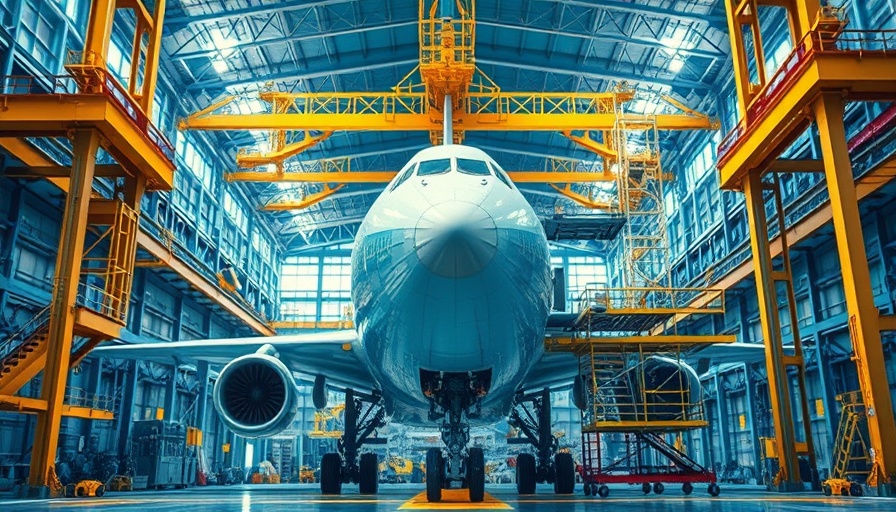
The Rise of Airbus: A New Era in Aviation
In an exciting turn of events within the aviation industry, the Airbus A320 has officially dethroned Boeing's 737 as the most delivered commercial aircraft in history. This milestone comes after Flynas, a Saudi budget airline, took ownership of the 12,260th A320 aircraft on October 7, 2025. Surpassing Boeing's impressive record, this achievement marks a pivotal moment in the narrowbody aircraft market, highlighting significant shifts in airline preferences toward more fuel-efficient and adaptable designs.
Charting the History of Innovation
The Airbus A320 series made its debut in 1988, bringing with it revolutionary innovations such as fly-by-wire controls and composite materials that established new standards in fuel efficiency and passenger comfort. Early on, critics questioned whether Airbus could truly compete against Boeing's long-standing dominance in aviation. Fast forward to today, and it’s clear that the A320's remarkable journey has indeed reshaped the industry landscape.
With over 19,352 orders and 12,260 deliveries, the A320 family now outstrips Boeing's 737—a plane that has been a staple in the skies since 1967. The demand for the A320, particularly as airlines work to streamline costs amidst rising fuel prices, illustrates an evolving market. Airline operators increasingly value the convenience and economic benefits of single-aisle jets.
The Environmental Edge: How Fuel Efficiency Drives Change
As eco-conscious travel becomes more prevalent, both airlines and passengers are seeking aircraft that offer lower carbon footprints. The A320neo (New Engine Option), introduced in 2016, has made significant strides here. This model boasts engines that are 15-20% more fuel-efficient than its predecessors, appealing to environmentally-minded budget carriers. This shift towards increased fuel efficiency is crucial, especially considering that single-aisle planes like the A320 now make up over 70% of global aircraft fleets.
Boeing’s Response: Challenges and Opportunities Ahead
While the rolls of Airbus are steadily increasing, Boeing faces its own set of challenges. The Federal Aviation Administration (FAA) constrained the Boeing 737 MAX output due to quality control issues, leading to a backlog that’s hampered deliveries. As Airbus celebrates its recent success, Boeing's issues reflect the inherent challenges all manufacturers face in maintaining reliability, production quality, and safety—from the lingering effects of the COVID-19 pandemic to ongoing trade disputes impacting supply chains.
Budget Airlines: The Driving Force Behind This Change
Low-cost carriers like Ryanair and IndiGo are reshaping the travel landscape by placing heavy emphasis on operational affordability, which directly contributes to the popularity of aircraft like the A320. These budget airlines are navigating the competitive landscape by opting for versatile aircraft that can maximize profits through efficiency and capacity. Flynas's significant purchase of the A320 series reinforces this trend, allowing the airline to expand operations into lucrative long-haul markets while keeping ticket prices accessible for the everyday traveler.
Future Trends: What Lies Ahead for Aviation
Looking ahead, we can surmise that demand for efficient, sustainable aircraft will only grow. Innovations like the A321LR and A321XLR variants, designed for extended range travel, allow airlines to operate on longer routes without the need for larger, less efficient widebody jets. As the aviation landscape evolves in response to climate change and economic factors, we can expect continued advances in engineering and operational strategies jam-packed in every single-aisle jet that's manufactured.
Conclusion: The Power of Transformation in Aviation
The Airbus A320’s ascendancy to the status of the most delivered aircraft not only signifies a shift in market dominance but also sets the stage for airlines to embrace more sustainable, cost-efficient travel options. As the aviation industry adapts to changing consumer demands for greener travel while seeking to enhance profitability, understanding these industry dynamics may empower travelers to make more informed decisions about their future journeys. This shift underscores the importance of staying informed and engaged in the conversation about sustainable air travel.
Are you excited about the future of sustainable travel? Discover how you can support eco-conscious flying choices while enjoying the perks of budget carriers. It's time to get onboard and make sustainable travel a local priority.
 Add Row
Add Row  Add
Add 




Write A Comment